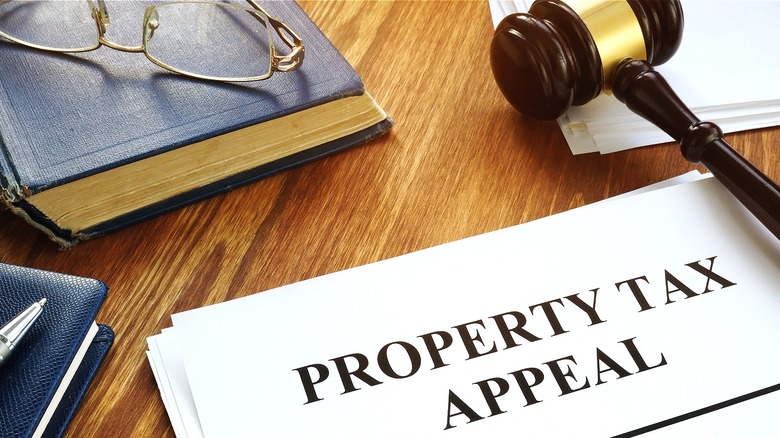How To Appeal Your Property Taxes
Following the huge increase in home values during the pandemic, your upcoming property tax bill might be shocking enough in a best-case scenario. However, what's even worse is if you suspect that your property may have been overvalued by the local taxing authorities. If that's the case, you'll want to consider appealing the high valuation, a process which might seem daunting, but is in fact fairly simple and quick and, if you win, can result in a lower property tax obligation. Despite this, per the National Taxpayers Union Federation, only around 5% of homeowners actually push back on their property tax assessments, even though many who go into the process prepared find success when they do.
To prepare for your assessment appeal, the first step is to do some research to verify that the lofty assessed amount is too high. Homeowners who aren't interested in selling their house, refinancing, or taking out a home equity loan might not be closely monitoring the local real estate market. Hence, they may not realize just how pricey their abodes have legitimately become. Using valuation sites like Zillow or Realtor.com, homeowners can view other properties in their neighborhood that are of similar size and have similar amenities to determine if their property is indeed worth as much as the tax assessor says that it is. In real estate parlance, these similar recent sales are known as "comps," short for comparables.
Get a professional second opinion
After doing some research on your own as you consider appealing your property assessment and associated taxes, if you're still convinced your home was overvalued by local assessors, it's time to get some professional help. One option is to hire a licensed appraiser. While an official appraisal is no doubt a weighty piece of documentation to have in your corner during an appeal, it's also pricey. According to a 2023 survey by the National Association of Realtors, the cost for an appraisal of a single-family home is $500.
Alternatively, consider asking a local real estate agent for an "opinion of value," also known as a "broker price opinion" or BPO. While perhaps not as substantive as an official appraisal, this quote is still considered a professional analysis of your home's value. Better still, real estate professionals and Realtors are oftentimes willing to perform this service for free as a way to generate goodwill and word-of-mouth references to help build their businesses.
Once a professional opinion confirms your own research that an assessed value is too high, let the city or county taxing authority know as soon as possible. Often, the window to appeal your home's value is quite small, like 30 to 45 days after the assessments are sent out, though some parts of the country allow as much as 90 days.
Be concise and polite when appealing
The process to appeal property tax valuations will vary by locale. You might be asked to mail your forms, along with any supporting documents like photographs or a professional's opinion of value, or you could be asked to do so electronically, or in person. Once your assessment appeal is submitted, next, await the board's decision, which may take up to a couple months. If the outcome isn't in your favor, an in-person appeal for reconsideration in front of a board may be an available option.
In other instances, taxpayers appealing their property assessments will appear in person right from the get-go. Whatever your situation may be, when you're interacting with the local taxing authority, keep your presentation concise and to the point, and most importantly, be polite. Getting angry and lobbing criticisms, or making politically charged statements, isn't going to help curry favor with the assessor. Further, some degree of negotiating skills also could come in handy if the outcome of the appeal is a compromise between the original assessed value and your findings.
An appeal might not be necessary
Besides verifying the assessed value for correctness, also make sure that you're receiving all of the eligible property tax breaks you deserve. For example, look into your state's "homestead exemption," which can lower your property taxes and shield your primary residence from creditors in the event of financial hardship or death. In some states, like Florida, the homestead exemption is available to all homeowners; in other states, you'll need to belong to a specific group (e.g., over 65 years of age, a veteran, etc.).
You'll also want to scrutinize the property assessor's description of your home, which you might be able to view online. If not, you may have to visit your local tax assessor's office or request that it be mailed, emailed, or faxed to you. Once you have it, look for discrepancies, like if the documents state your home has four bedrooms when it only has two. If such mistakes are found, the tax assessor may adjust the value — and your subsequent property tax bill — immediately, without you needing to go through a formal appeals process.
Finally, if the assessor makes a mistake in your favor, such as assessing a three-bedroom home as a two-bedroom, it's probably best to avoid appealing your assessed value. In rare cases, appealing your property taxes can actually backfire and cause your property's assessed value to rise if the assessor discovers new information about your home through the appeals process, like a swimming pool or finished basement.



